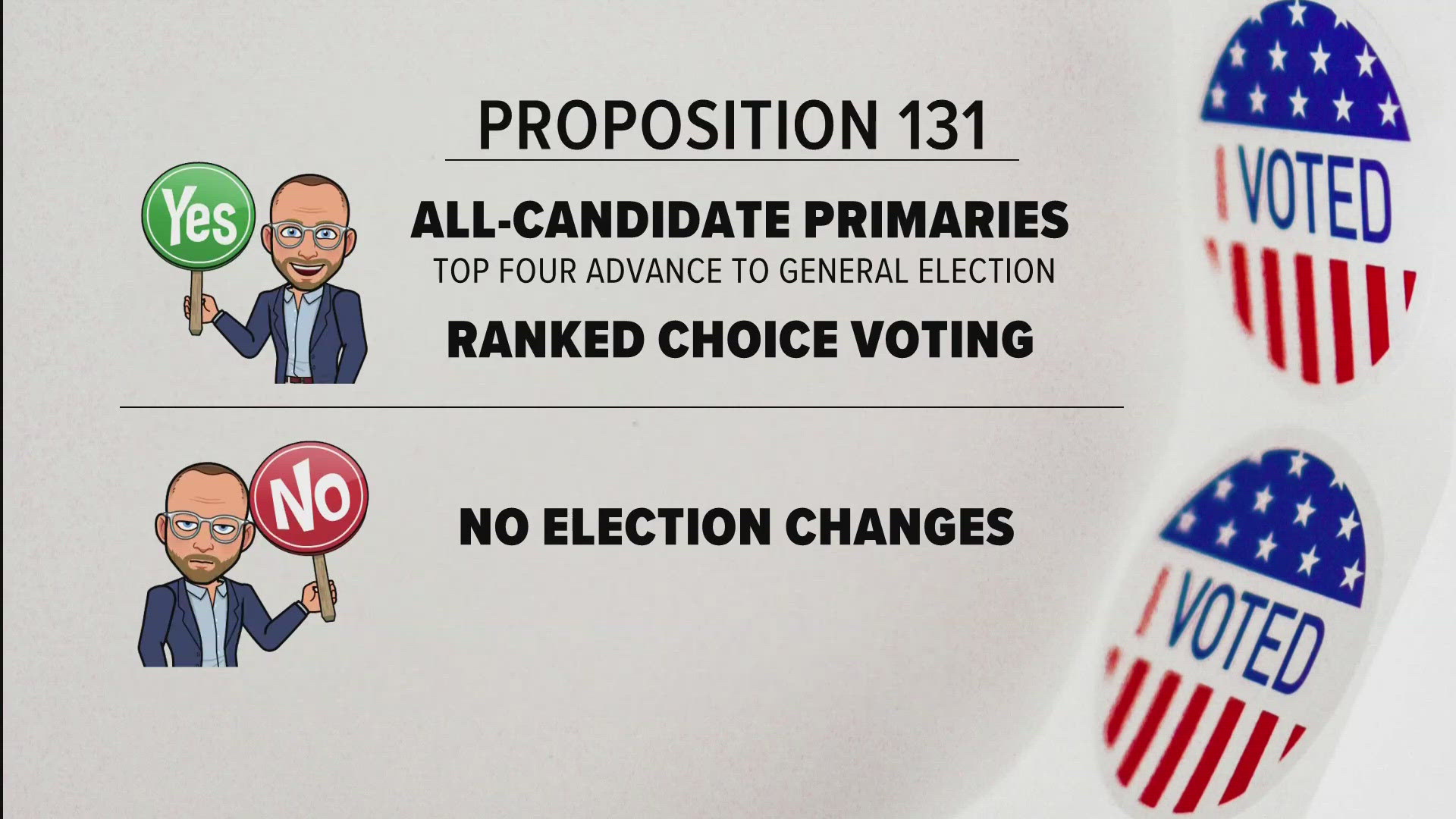COLORADO, USA — Get ready for sticker shock in the form of an election ballot.
There are 14 statewide ballot issues that every voter in Colorado we see on their ballots that get mailed on in three weeks. Next with Kyle Clark has received the most questions about Proposition 131.
Proposition 131 is the ballot issue that would change how Coloradoans elects candidates.
“Shall there be a change to the Colorado Revised Statutes creating new election processes for certain federal and state offices, and, in connection therewith, creating a new all-candidate primary election for U.S. Senate, U.S. House of Representatives, governor, attorney general, secretary of state, treasurer, CU board of regents, state board of education, and the Colorado state legislature; allowing voters to vote for any one candidate per office, regardless of the voter’s or candidate’s political party affiliation; providing that the four candidates for each office who receive the most votes advance to the general election; and in the general election, allowing voters to rank candidates for each office on their ballot, adopting a process for how the ranked votes are tallied, and determining the winner to be the candidate with the highest number of votes in the final tally?”
Proposition 131 would do away with primaries and creates all-candidate primaries. The ballot issue would also change general elections in November to ranked choice voting for elections involving members of Congress and state offices.
Ranked choice voting would impact the following general election races:
- U.S. Senator
- U.S. Representative
- Governor
- Secretary of State
- State Treasurer
- Attorney General
- State Board of Education
- CU Regent
- State Senator
- State Representative
Ranked choice voting would not be used in the election for president, district attorneys or local city and county offices (unless those local cities and counties have enacted their own ranked choice voting policies).
If Proposition 131 is voted in, it creates one ballot for all primary candidates. A voter would choose one candidate, but the top four vote-getters would advance to the general election regardless of party affiliation.
That means there could be four Democrats to choose from in the November election for Congress or state offices. There could be four Republicans. There could be four unaffiliated candidates. There could be two unaffiliated and two Democrats. There could be two Republicans, an unaffiliated and a Democrat. You get the idea.
If Proposition 131 is voted in, it would also change how general elections work. The proposition would create ranked choice voting, where one voter can rank their choices of several candidates.
However, just before the end of the legislative session this year, state lawmakers passed a law adding requirements that must be met before ranked choice voting begins.
At least 12 cities or municipalities must conduct ranked choice voting and then be audited by the Secretary of State’s Office with:
- Three of those municipalities must be in counties with active voter populations greater than 250,000, like Denver, Adams or Boulder Counties.
- Three must be in counties with voter populations between 37,500 and 250,000, like Pueblo or Mesa Counties.
- Three must be in counties with voter populations between 10,000 and 37,500, like Summit or Elbert Counties.
- And three must be in counties with fewer than 10,000 active voter populations, like Yuma or Clear Creek Counties.
All that to say, it is not clear when ranked choice voting would begin if Proposition 131 passes.
If the proposition passes, the Secretary of State’s Office has said it would need to raise business fees in order to fund some county election reimbursement costs. The Secretary of State’s Office has not said which fees would go up or by how much.
Although, the basic periodic report fee just increased to $25 this year. It used to be $10 a year, but went up because the office needed more revenue to help fund current county election cost reimbursement.
If Proposition 131 isn't voted in, no changes are made to elections.
“One of the things I always look at is who is behind something, who’s paying for it and who us it going to benefit the most. And so, those would be things that I would like to know behind this proposition,” Janet Mattox, a Denver voter, told Next with Kyle Clark.
Kent Thiry, the former CEO of DaVita, is behind the ballot measure.
He has given $1.4 million to Colorado Voters First, the group created to campaign in favor of Proposition 131.
That group has more than $8.6 million, with nearly $4.7 million from Unite America, a Denver-based nonprofit, in favor of election reform, which does not disclose its donors.
The "No on Prop 131" group called Voter Rights Colorado has raised $31,000 from progressive groups that also do not disclose donors.

